Back in June, when our Ed got a 30-minute hands-off glimpse of Avatar: Frontiers Of Pandora, he had suspicions that Ubisoft’s next big open world-athon was hiding some dark, terrible secret beneath the surface. It was almost too good, and too lovely-looking to be completely true, he proposed, and the brief tour of this rather enormous-looking game wasn’t quite long enough to really dig beneath the surface to see if Ubisoft’s lofty promises would hold up to closer scrutiny.
Now, just over a month from release, I’ve finally been able to put it under a proper microscope, playing two hours of the thing from around the 25% mark of its campaign. And it really is as visually impressive as Ed suggested all those months ago. At long last, this is a game that looks and feels like an actual « next-gen » blockbuster (or as much as a game can, at least, when we’re already several years into the current generation cycle). But Ed was also right to feel a wee bit suspicious of Frontiers Of Pandora. Perhaps not in the way he expected, but enough that I heard the same thing being muttered over and over again by almost everyone at the end of my preview session at Ubisoft’s UK offices: « I can’t work out where the heck I’m meant to be going, or what I’m supposed to do. »
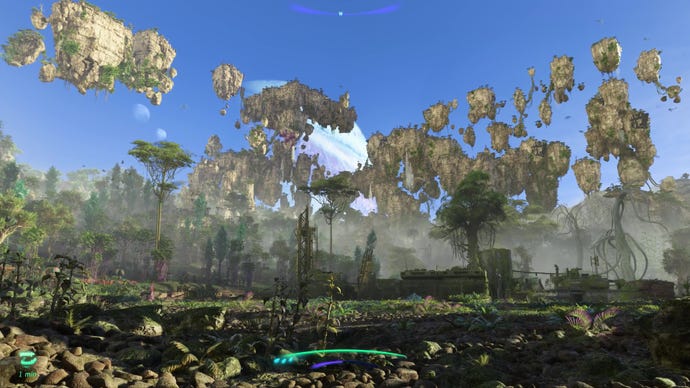
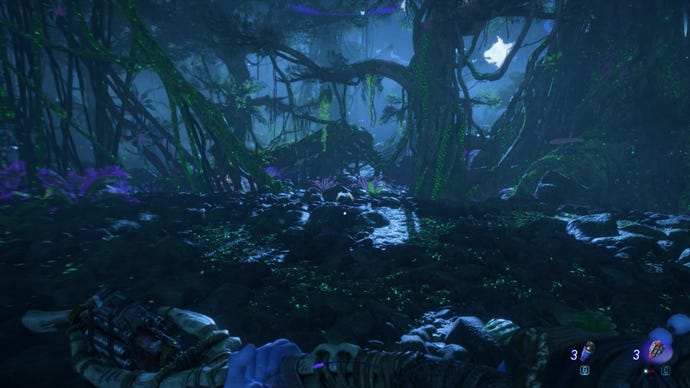
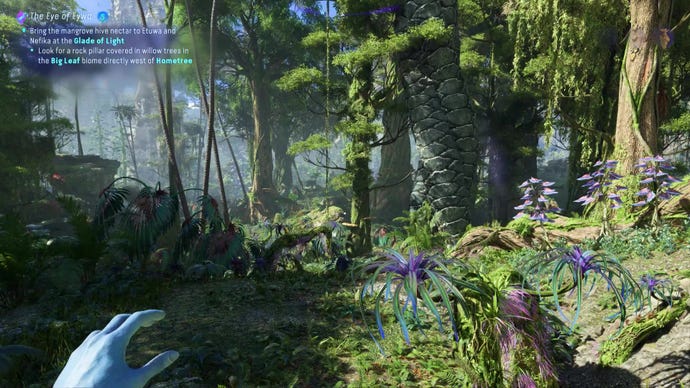
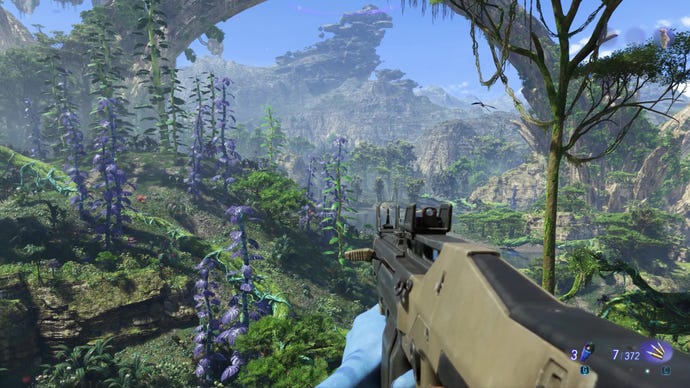
The Na’vi have a navigation problem. This is in part, I suspect, a result of being chucked into a game a quarter of the way through its campaign without having absorbed its controls and nuances compared to other Ubisoft open world games. I, too, had quite a struggle fulfilling the first quest objective when I started playing, which involved finding a very specific kind of nectar (from a very specific location, it turned out) in order to prepare a ritual of some kind to work out why a particular animal in this part of Pandora was behaving strangely. By the end of my demo, I felt more acclimatised to Avatar’s way of working, and I’d hope that, were I playing from the beginning from the game, this would all have been tutorialised properly as you’d expect from a big, flashy licence tie-in.
You see, Avatar operates in quite a different fashion to other Ubi open worlders. Instead of your objective being a constant dot on your compass horizon at the top of the screen a la Assassin’s Creed, Avatar relies on a combination of your Witcher Sense-style Na’vi vision and using the clues in your quest objectives to match them to parts of your map. That, and just using your own eyeballs to clock certain landmarks that aren’t well represented by the topography of your world map menu. Simple, you might think. After all, Assassin’s Creed has also dabbled in these ‘look for the tall mountain in so-and-so region next to the river that looks like a snake’ kind of instructions for a while now, and they’ve always been painfully easy to suss out when consulting your map screen.
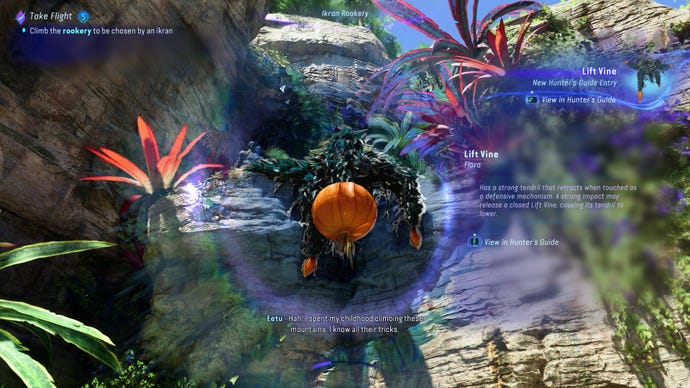
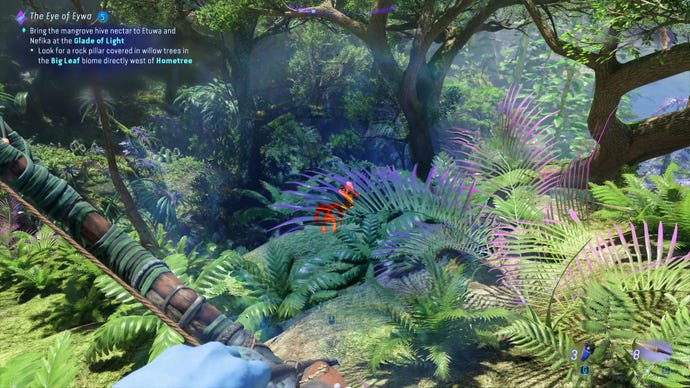
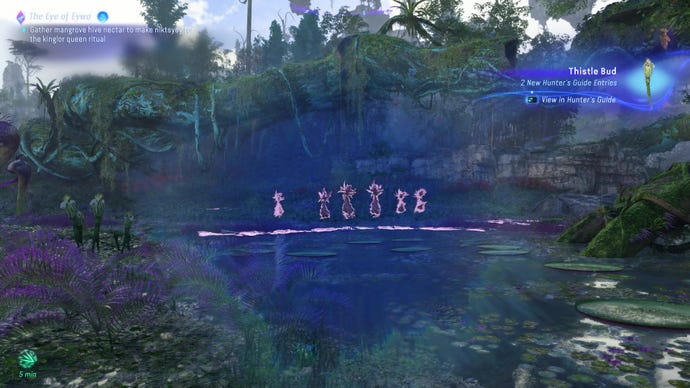
Avatar, however, requires more diligent interrogation of its environment – which I actually found very refreshing, all things considered, but I worry that others may find it causes so much friction that it teeters over into frustration. It took me an embarrassingly long time to realise that your Na’vi vision, for example, will highlight the rough area your objective’s in as a big light turquoise smudge in your field of view. Partly because it was only a slightly different shade of green/blue to some of the other things your senses highlighted, including permanent health upgrade seeds and other harvestable plants and resources – though again, this is probably because I hadn’t been taught how to distinguish these things beforehand. You can also pick up the (purple) scent of animal trails with your Na’vi senses – handy, for example, if you come across one of its skittish creatures who have giant dart needles sticking out of them that need to be healed, or you’re looking for a beast that’s been captured by the remaining pockets of the game’s antagonists, the RDA.
However, that green smudge will disappear altogether once you’re in the rough area you need to investigate, so you really do need to use your eyes to work out the exact location for where you’re meant to be headed – and in a world that’s so visually dense, colourful and alive with just… everything, this was a lot trickier than I was expecting. For example, previously uncovered locations don’t get added to your wider map screen after you’ve discovered them, making them harder to pinpoint like Assassin’s Creed’s obvious towns and caves. Really, the only thing your map gives you to work with are the wider region names of an area. Individual biomes within those regions are hidden away on a separate layer of the map menu, and if you want to ‘track’ a specific item or plant, you’ve got to dig into another menu tab before you can highlight it in a more obvious shade of yellow in your Na’vi senses.
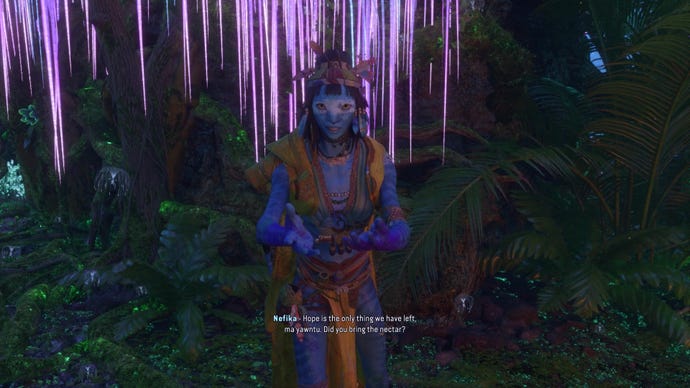
This is how I eventually tracked down the very specific kind of hive nectar I was after in the end, because while fruits and other objects can be identified and analysed within your Na’vi vision by pressing your mouse’s scroll wheel, there’s nothing to really distinguish one plant from another otherwise – unless you’re so deep into Avatar flora and fauna lore that you immediately know what a leopard palm looks like versus a skunk palm, for example. There are no shining outlines, no obviously yellow/red/your primary colour of choice markings on them to make clearly stand out from everything else in front of you – and even the ones that do have the odd eye-catching glow about them aren’t always things you can harvest from either. In other words, Avatar does a brilliant job of making its world feel suitably alien and in keeping with the films, but in doing so you have to undo a lot of video game muscle memory to try and parse what you’re looking at.
As I said, I actually really enjoyed how different and unusual it felt in the playing of it, even if flicking between its various menu screens wasn’t quite as fluid as I’d perhaps like in this situation. Equally, I did also do a bit of a doubletake when I heard that this was actually the more guided ‘easy’ implementation of Avatar’s HUD screen, and that there was also an even more hands-off, green-smudge-less iteration of it compared to what I’d experienced in my preview session. Some people will probably love all this stuff. Others, however, may hate it, and we’ll have to wait until review code comes in before we can see how much of a mental drain it is in the full game.
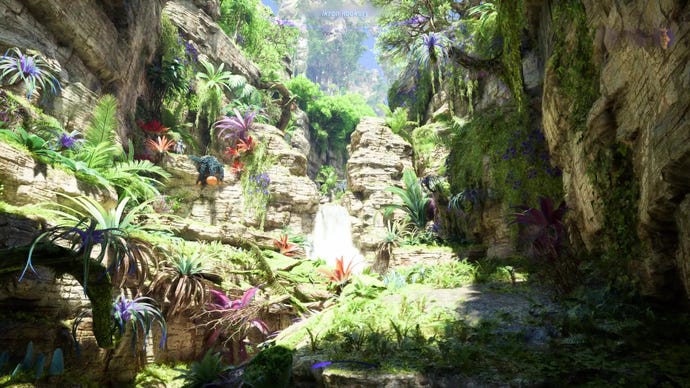
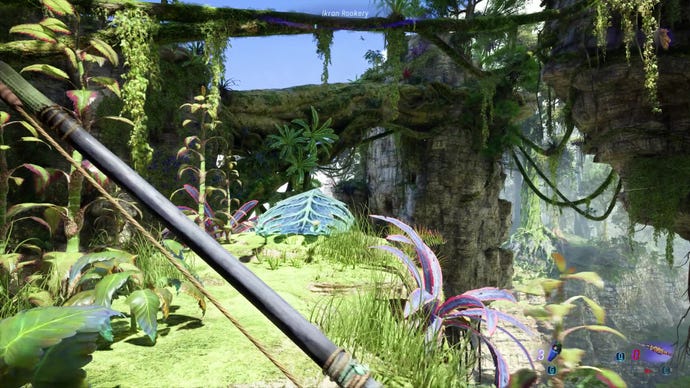
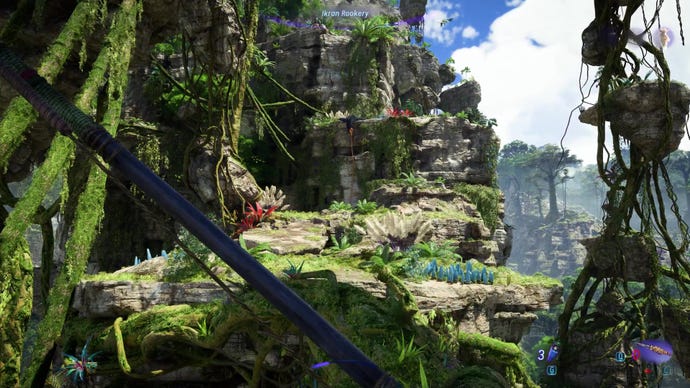
Because the thing is, if you can get into the swing of how its navigation works, Frontiers Of Pandora is really quite something. Yes, there are the bones of a Far Cry here in some of the objective types you end up encountering, but it also feels distinctly Avatar at the same time. Your skill tree, for example, is presented as a set of Na’vi memories you must rediscover as you try and part the fog of your RDA-induced amnesia, and when you harvest a bit of fruit from a plant, you have to literally hold down the mouse button to grip it before moving your mouse in a specific direction to pluck it from its pod. These angles of extraction vary depending on the plant, and for me, this additional layer of tactile problem solving was yet another welcome departure from the altogether more mindless resource gathering we so often see in Ubi open world games.
Similarly, some of the sequences I played could have been ripped straight out of the films, such as climbing up the ikran rookery to get your own flying companion pal, and raiding a large RDA facility to take out its disruptive radio towers and restore peace to the creatures of the region. These sequences are a lot more focused than gambling about in the open world, and the ascent up the ikran rookery in particular felt commendably naturalistic as I tried to tame my big dragon bat.
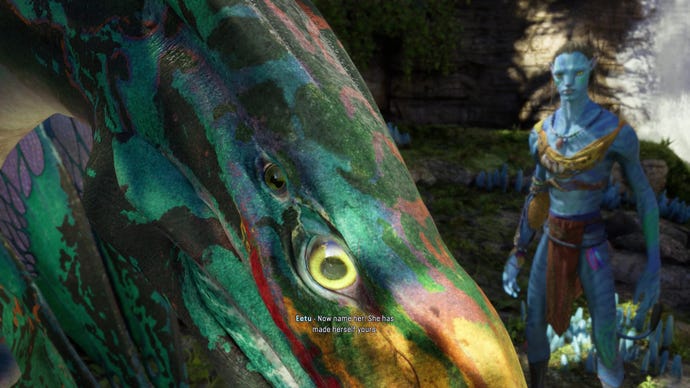
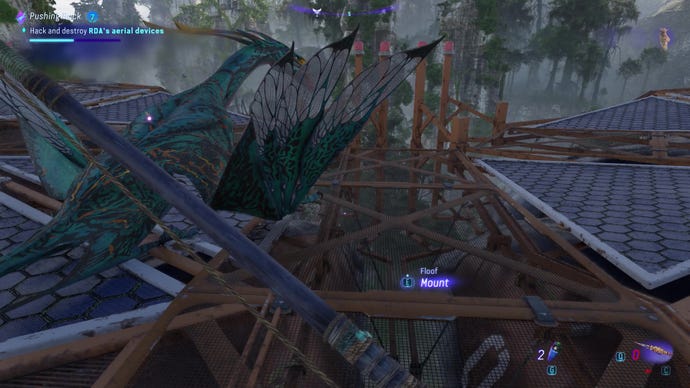
Again, there are no obvious daubs of yellow paint to be seen here, but the artful construction of its winding mountain paths always felt like they were drawing my eyes in the right direction, and it does quite a clever job of concealing the game-ier parts of the environment, too. There are plants that will hurl you across huge gaps, for example, while others act as spring pads to launch you upwards, but they also look like natural parts of the world, and have fun, diegetic descriptions to match if you analyse them with your Na’vi senses – the bounce pads being a ‘defence mechanism’ to keep predators away, for example. When I was running and jumping in the flow like this, while also having very, very Avatar-like music blasting in my ears, I felt so fully immersed that the lines between film and video game felt near non-existent. It even has the zhoopy red plants from the film that make that blowing-into-a-cardboard-tube vrrhup, vrrhup, vrrhup noise as they spiral into themselves when you try and touch them! Heck, I don’t even like Avatar all that much, but even I was quietly delighted by this.
Those lines did, admittedly, come crashing back into view whenever I whipped out my AK47 – the setup of the story is that your Na’vi’s a product of human indoctrination into the RDA before being liberated to return to your native roots. And there was also a particular hacking minigame I encountered enroute to the big RDA raid that was actually impossible to perform on a mouse and keyboard. In fact, my demo handler insisted I switch over to the PS5 controller for these sections, as the pressure-sensitive ring puzzles seemed so innately tuned to the DualSense 5’s adaptive trigger buttons that they straight up didn’t work when I attempted to do the same on my mouse. I have no idea how Ubisoft Massive are going to adapt/fix this for the PC version (or indeed Xbox controllers, since these weren’t available during my demo either), because it would be dumb in the extreme to have to have a game pad handy for these very specific sequences.
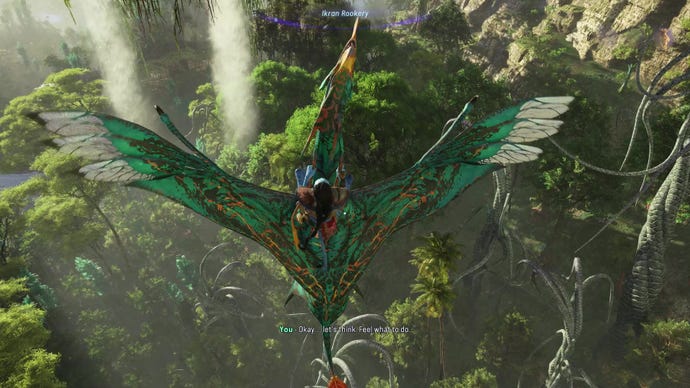
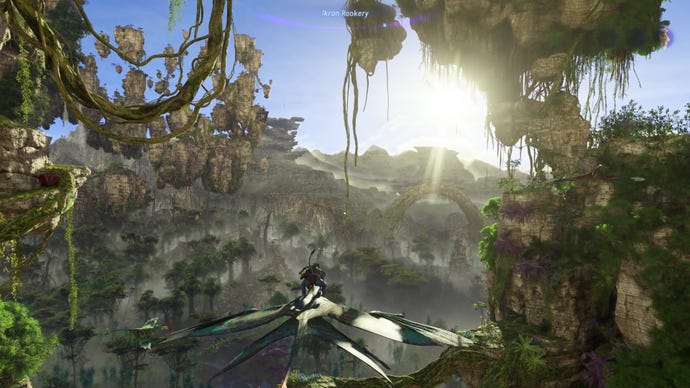
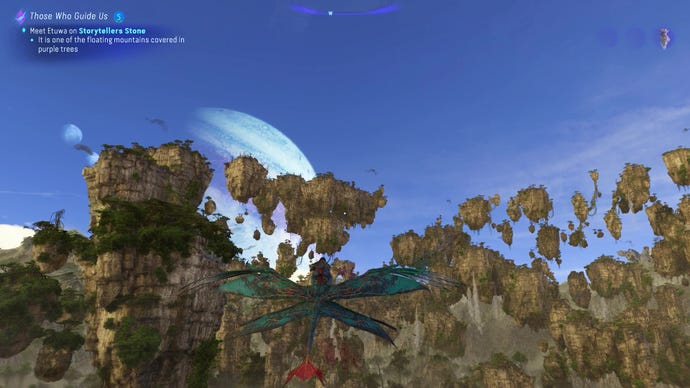
Those irritations aside, though, the gunplay and subsequent bow and arrow skewering felt pleasing in the hands, with the latter proving particularly (perhaps almost stupidly) effective against the RDA’s giant mech soldiers. This is where you remember, ‘Ah, yes, this is secretly a big, dumb, fun video game underneath all the Avatar nonsense’, and it has all the same kinds of loot, power levels and gear crafting you’ve seen in other Ubi games. Then again, I’m not gonna lie: the power fantasy of taking down giant helicopters with just a couple of well-placed arrow blasts was enough to make the lizard part of my brain clap its hands in stupefied delight. It’s not terribly sophisticated at the end of the day, but hey, I know this to be true of most Ubisoft games these days and yet I still end up playing them for 100+ hours, so the joke’s (probably) on me, I guess.
That said, I did appreciate one moment during the RDA raid when, upon reaching the standard kind of identikit treasure room inside the belly of its refinery, my Na’vi muttered, ‘Bet there would have been more if I’d been a bit quieter’, as by that point, my attempt at stealthing in had gone awry and everyone was on high alert. It was hard to tell exactly what I’d missed out on treasure-wise, to be honest, as most of the cases were still full of things I could stuff into my inventory pockets, but the suggestion that stealth players will be more amply rewarded than going in all guns blazing gets a big thumbs up from this immersive sim-liker. Though again, the idea of a 9ft tool blue smurf sneaking around unseen in these big grey concrete buildings does somewhat defy belief.
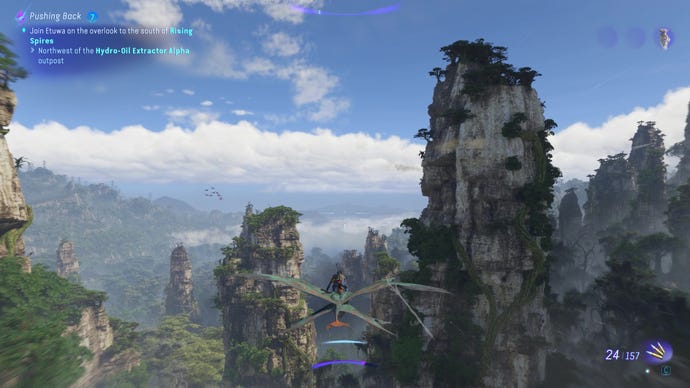
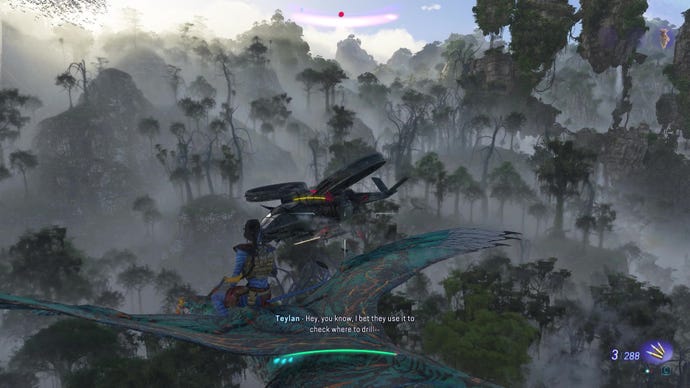
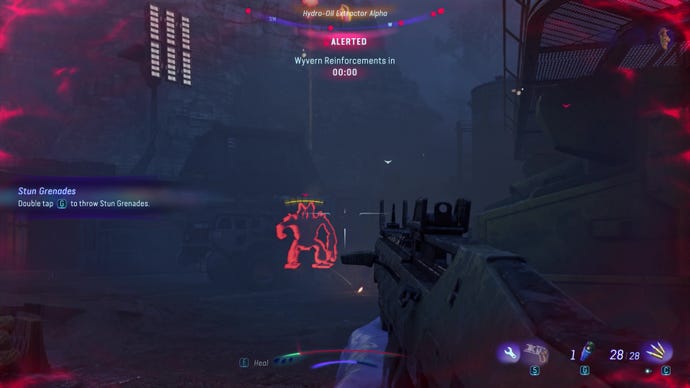
This is, of course, just a tiny slice of what is clearly a very large game. I still have a few concerns over how it’s all going to come together, but if Frontiers Of Pandora can sustain that swell of emotions I felt climbing up the ikran rookery across all of its big story beats, resisting the urge to descend into yet another Ubisoft collecathon fest, then there’s definitely a fun time to be had here, regardless of how into Avatar you are. As I say, I can’t say I have particularly strong feelings about the films or their wider themes, only that they felt quite game-like seeing them at the cinema, so if nothing else, a game of a film that also feels like a game is probably a weirdly good fit for it.
At times, Avatar: Frontiers Of Pandora is almost what I imagine a more alien-themed Death Stranding might look like without all the Kojima nonsense piled on top of it, in the way it asks you to read and interact with the world around you. But then a moment later, its kaleidoscopic prism will shift to reveal a glint of The Division, before twisting yet again to settle into a kind of spiritual sequel to Far Cry Primal. Just, you know, with flying bat dragons and fluorescent horses instead of woolly mammoths and sabretooth tigers.
So no, I don’t think Frontiers Of Pandora is hiding anything truly dark and sinister in its lush, alien forests, unless you really can’t stand the idea of navigating its world using your own faculties for a change. It is still, for good and for ill, an Ubisoft game at the big blue heart of it all, albeit one that’s clearly trying to do something just a little bit different to the kind of popcorn-munching fare we normally get shoved down our throats. Am I suspicious of it still? Not really, though I do wonder how long it will take for my current cautious optimism to be dashed against its floating mountain ranges. I hope Avatar will be the exception to the usual Ubisoft rule when it comes out on December 7th.









